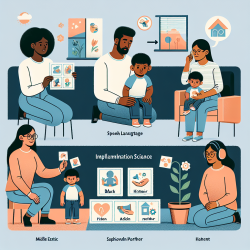Understanding the Impact of Childhood Poverty and Adversity on Mental Health
As a Special Education Director, staying informed about the latest research is crucial for developing effective interventions. A recent study titled Unique roles of childhood poverty and adversity in the development of lifetime co-occurring disorder offers valuable insights into how childhood experiences shape mental health outcomes. This blog explores the study's findings and suggests ways practitioners can apply this knowledge to improve their skills and better support students.
Key Findings of the Research
The study conducted by Jenna van Draanen at the University of British Columbia examines the roles of childhood poverty and adversity in the development of co-occurring disorders (COD), which include both psychiatric and substance use disorders. The research highlights significant gender differences in how these factors affect individuals throughout their lives.
- Approximately 17.5% of individuals experience lifetime COD, with prevalence rates differing between males and females.
- Childhood poverty increases the risk of COD for males but not for females.
- Both males and females show increased COD risk with a higher number of childhood adversities, though the effect is more pronounced in males.
Implications for Practitioners
Understanding these findings can help practitioners tailor interventions to address the unique needs of students affected by childhood poverty and adversity. Here are some strategies to consider:
- Gender-Specific Interventions: Recognize that males and females may respond differently to childhood poverty and adversity. Tailor interventions to address these differences, focusing on building resilience and coping strategies.
- Early Identification and Support: Implement screening tools to identify students at risk of developing COD due to early life adversities. Provide targeted support and counseling to mitigate these risks.
- Collaboration with Families: Engage families in the intervention process to create a supportive environment at home. Educate parents about the impact of childhood adversities and the importance of positive family dynamics.
- Professional Development: Encourage staff to participate in training sessions and workshops to enhance their understanding of the effects of childhood poverty and adversity on mental health.
Encouraging Further Research
While this study provides valuable insights, it also highlights the need for further research to explore the mechanisms underlying these gender differences and to develop more effective, evidence-based interventions. Practitioners are encouraged to stay informed about ongoing research in this area and to contribute to the body of knowledge through their own observations and experiences.
Conclusion
By understanding the unique roles of childhood poverty and adversity in the development of co-occurring disorders, practitioners can better support students facing these challenges. Implementing gender-specific interventions and fostering collaboration with families are essential steps in promoting positive mental health outcomes.
To read the original research paper, please follow this link: Unique roles of childhood poverty and adversity in the development of lifetime co-occurring disorder.










